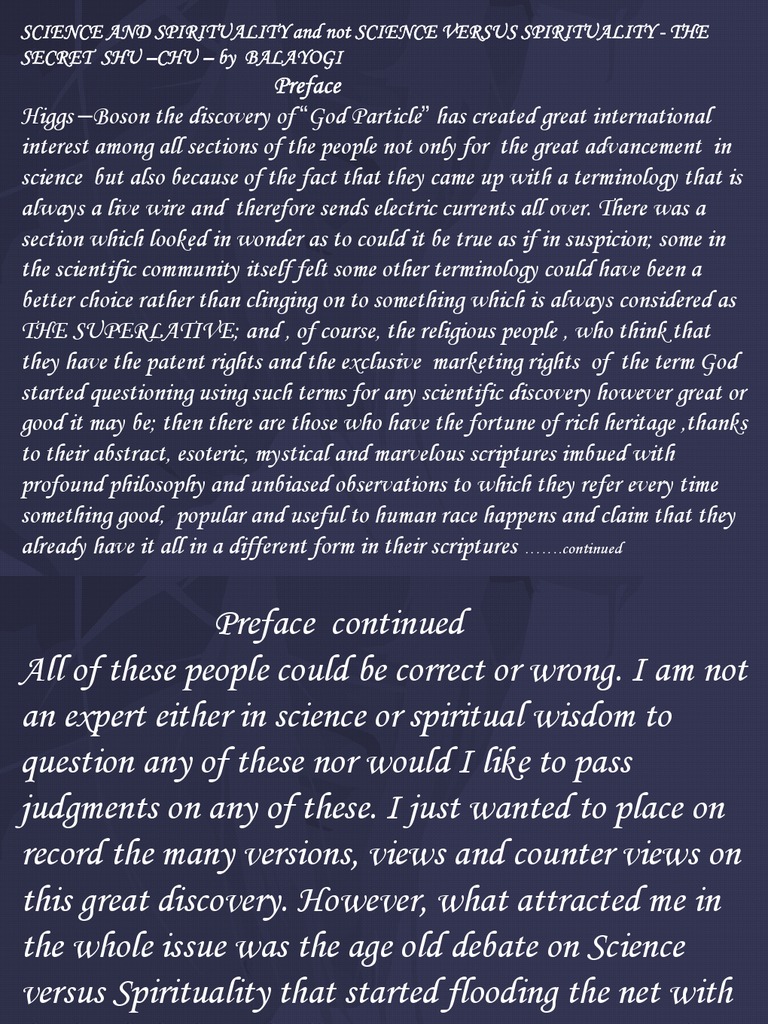In the discourse on spirituality and the scientific method, the Bahá’í teachings offer a harmonious synthesis that transcends traditional dichotomies. This melding of spirituality and empirical inquiry is rooted in the Bahá’í belief that true knowledge springs from both spiritual insight and scientific exploration. Below, we delve into the multifaceted components of this edifying framework, elucidating how Bahá’í principles advocate for a balanced pursuit of truth that honors both the spiritual and material realms.
The Foundation of Bahá’í Teachings
At the core of Bahá’í thought lies the premise that religion and science are two complementary systems of knowledge, each possessing its own unique idiom. Bahá’u’lláh, the founder of the Bahá’í Faith, posited that religion must be in harmony with science; otherwise, it risks obsolescence. This foundational principle encourages adherents to explore the universe with both the mind and the spirit, recognizing that each pathway contributes to a comprehensive understanding of existence.
Spirituality: An Innate Human Pursuit
Spirituality, in the Bahá’í context, is perceived not merely as a religious experience but as an innate aspect of human experience. It urges individuals to seek a deeper connection with the divine, fostering virtues such as enlightenment, love, and service. Spirituality involves personal introspection and the pursuit of virtues that elevate the human soul beyond mere materialistic pursuits. The emphasis is placed on cultivating attributes like compassion, justice, and humility, which enhance interpersonal relationships and create a more cohesive society.
Bahá’í teachings advocate for daily spiritual practices that include prayer, meditation, and reflection. These practices serve as conduits for inner transformation, facilitating a personal connection to the divine and promoting a flourishing spiritual life. Through spirituality, believers are encouraged to align their actions with higher principles, fostering an ethic of service that transcends cultural and geographical boundaries.
The Scientific Method: A Framework for Inquiry
Parallel to the exploration of spirituality is the rigorous pursuit of knowledge through the scientific method. The Bahá’í perspective affirms that science is a powerful instrument for understanding the physical universe. It emphasizes observation, experimentation, and reason as fundamental tenets. The scientific method engenders a critical approach to inquiries about existence, providing reliable methods for uncovering truths about the natural world.
The dually enriching approach espoused by Bahá’í teachings posits that scientific inquiry should not be devoid of ethical considerations. Instead, ethical implications must be woven into the fabric of scientific exploration. This creates a fertile ground for inventions and discoveries that serve humanity’s collective welfare, rather than merely achieving technological advancement devoid of moral grounding.
The Synergy of Spirituality and Science
An integral aspect of Bahá’í doctrine is the belief in the intrinsic connection between spiritual and scientific truths. According to these teachings, the advancement of civilization is contingent upon both spiritual and scientific development. When one pursues knowledge, whether spiritual or scientific, an individual uncovers layers of understanding that lead to a more profound appreciation of existence.
This synergy manifests in the promotion of education as a fundamental right, empowering individuals to contribute meaningfully to society. Through education, individuals gain insights into both the material and spiritual aspects of life, culminating in a holistic worldview. Such an approach cultivates critical thinkers who can engage harmoniously with the complexities of modern existence, addressing challenges with integrated solutions.
Crisis and Opportunity: The Role of Spiritual Inquiry
In the face of contemporary challenges—such as environmental degradation, social injustice, and conflict—the Bahá’í teachings urge followers to employ both spiritual inquiry and scientific investigation to navigate these crises. Spirituality provides the moral compass necessary to evaluate the ethical ramifications of scientific advancements, while science offers practical methodologies to address tangible issues.
This dual approach cultivates an environment where solutions may emerge from interdisciplinary collaboration. Engaging in thoughtful dialogue between scientists and spiritual leaders can lead to more comprehensive understandings of issues such as bioethics and the sustainability of natural resources. Such collaboration fosters mutual respect, bridging gaps between faith-based and secular perspectives.
Practical Applications of Bahá’í Teachings in Modern Society
The ramifications of combining spirituality with the scientific method extend far beyond individual belief systems; they penetrate the fabric of society. Educational institutions inspired by Bahá’í principles often integrate moral education alongside academic curricula, instilling future generations with a balanced perspective that honors both the spiritual and the rational.
Furthermore, social initiatives fostered within the Bahá’í community—such as efforts in poverty alleviation, healthcare access, and conflict resolution—exemplify the practical application of these teachings. These initiatives are informed by both ethical imperatives derived from spiritual teachings and data-driven approaches based on scientific research, ensuring that they are both substantive and constructive.
A Vision for Future Endeavors
Looking ahead, the Bahá’í commitment to reconciling spirituality with the scientific method presents an expansive vision for future human endeavors. As global challenges become increasingly complex, the underlying teachings emphasize that a synthesis of knowledge and ethics is required to foster genuine progress. By nurturing an ethos that honors both dimensions, individuals and societies may advance toward a more enlightened and harmonious existence.
In conclusion, the Bahá’í perspective on spirituality and the scientific method illuminates pathways for a more integrated approach to understanding humanity and the universe. This holistic examination encourages individuals to embrace a more profound inquiry while fostering the ethical obligations that accompany the quest for knowledge. Such a legacy solidifies the belief that through the amalgamation of spiritual understanding and scientific inquiry, humanity can cultivate a brighter, more sustainable future.
